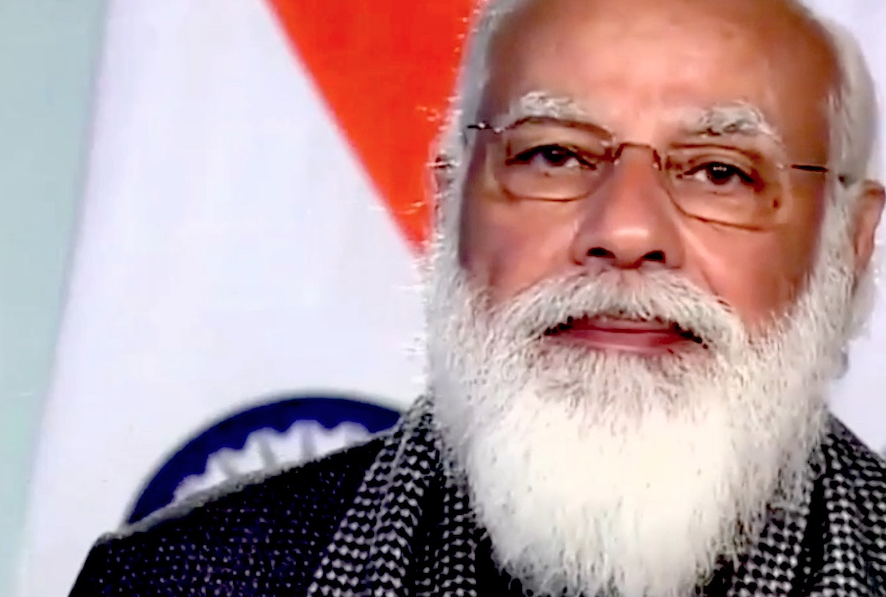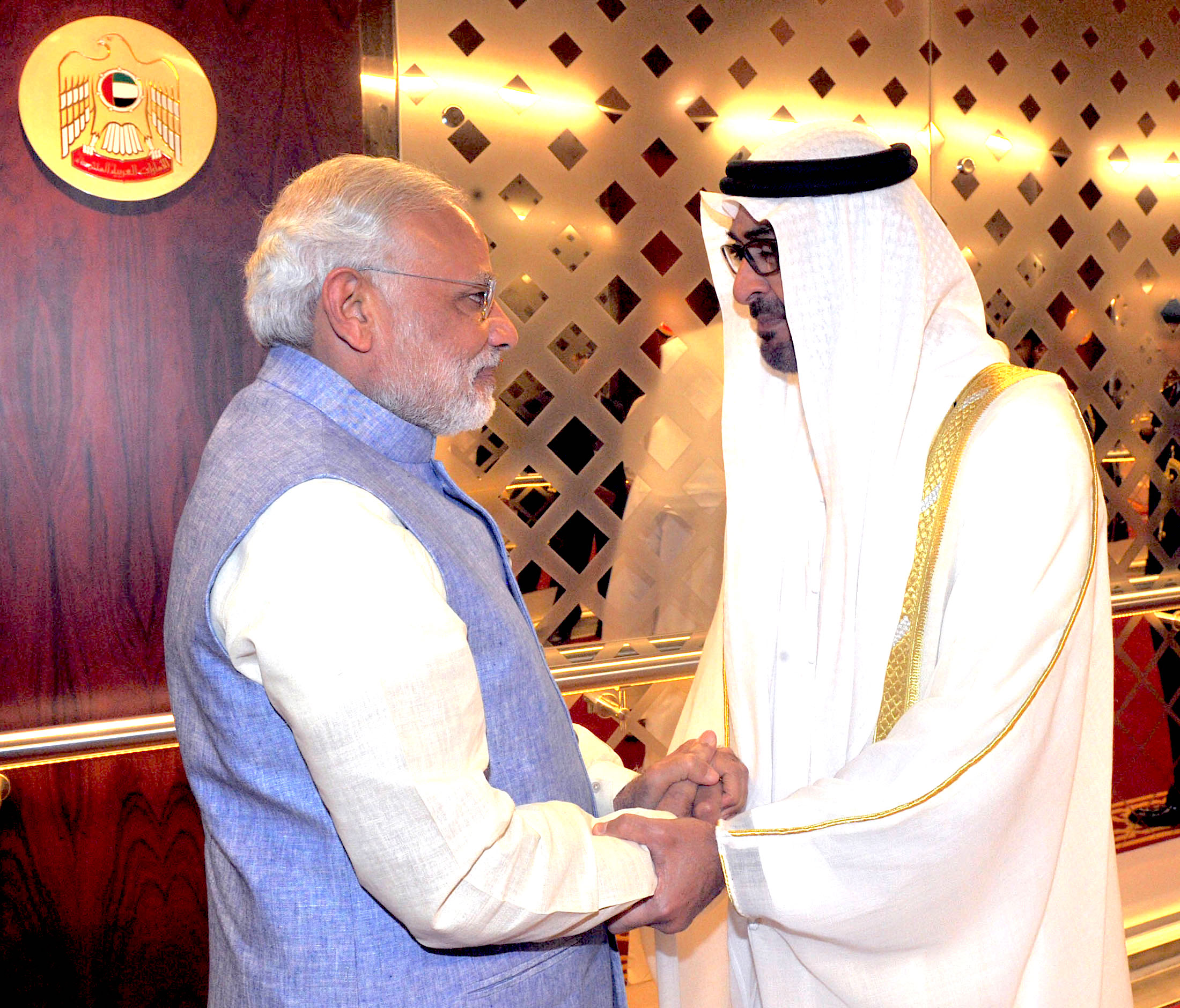The incident reflects how difficult it is for journalists to collate rising reports of religion-based hate crimes under the Modi government, writes Betwa Sharma.

Narendra Modi, prime minister of India, in 2020. (World Economic Forum/, Flickr, Pascal Bitz)
By Betwa Sharma
in New Delhi
Article14
 Two days after the Oxford University-based Reuters Institute for the Study of Journalism published Rachel Chitra’s research paper on hate crimes in India and shared it on Twitter, where it was well-received, Forbes Middle East terminated her as its Asia correspondent on Feb. 2, effective immediately.
Two days after the Oxford University-based Reuters Institute for the Study of Journalism published Rachel Chitra’s research paper on hate crimes in India and shared it on Twitter, where it was well-received, Forbes Middle East terminated her as its Asia correspondent on Feb. 2, effective immediately.
The termination of Chitra’s services is the third action related to a database of hate crimes in India since 2017, when Hindustan Times took down its hate tracker initiative started two years earlier. The demise of that tracker was followed in 2019 by the closing of a hate-crime database run by FactChecker, a website run by the Spending and Policy Research Foundation, a journalism nonprofit.
Read this new paper from our Journalist Fellow @rachelchitra on covering hate crimes in India when government sources fail
? Rachel worked with @silviamajo to create a database of hate crimes reported by the English-language media from 2014 to 2020https://t.co/VjXRTpWrMh
— Reuters Institute (@risj_oxford) January 31, 2022
Forbes Media is a global media outlet famous for publishing the list of the wealthiest people every year. Forbes Middle East is “the licensed edition of Forbes for the Arab world” and “extends the Forbes brand of journalism across the Arab world.”
Forbes Middle East is based in Dubai, part of the United Arab Emirates (UAE), an elective monarchy of seven emirates with deepening ties to the Indian government. These ties have been nurtured by Prime Minister Narendra Modi, who received the UAE’s highest civilian award in 2019. Both countries share intelligence and cooperate on defense, trade and infrastructure.
Chitra’s firing reflects how difficult it is for journalists to collate rising reports of religion-based hate crimes under the Narendra Modi government, even as its leaders downplay these attacks, characterizing them as a law-and-order problem, denying they are part of a larger pattern linked to Hindu fundamentalists backed by the ruling party.
The abrupt termination of Chitra’s services by a global company in a foreign country may be an indication of the influence India’s government is prepared to wield beyond its borders in matters that go against the ideology of Modi’s Bharatiya Janata Party (BJP).
The most recent example of this determination is the apology delivered on Feb. 8 by the South Korean government for social-media posts about Kashmir issued by a Pakistani dealer of Hyundai, a Korean car company.
Locked Out of Office Email, Then Fired
Chitra joined Forbes Middle East on 25 October 2021, three months and a week before being terminated on Feb. 2, without an exit interview or prior communication.
On the morning of the day that Chitra was fired, the tweet put out by the Reuters Institute was reshared by Kafeel Khan, a doctor jailed twice for standing up to the BJP government in Uttar Pradesh (UP).
On Aug. 10, 2017, Khan ran from pillar to post organizing oxygen cylinders when the piped oxygen supply to the Baba Raghav Das Medical College in the eastern UP town of Gorakhpur was disrupted on Aug. 10, 2017, due to the non-payment of Rs 68 lakh to a liquid oxygen supplier.
In exposing the negligence behind the tragedy, Khan triggered the first major embarrassment for the UP government three months after it came to power. “Thank you for your values,” said Chitra in her reply to Khan. “Your journey has been difficult in the current climate of hate. More power to you!!!”
Thank you Dr Kafeel. I admire the values you stand for. Your journey has been difficult in this current climate of hate. More power to you!! #everydayheroes
— Rachel Chitra (@rachelchitra) February 2, 2022
Later that day, Chitra received a call from a woman in the HR team who asked her why there were so many mentions of her on Twitter, who Kafeel Khan is, whether he is a “terrorist” and why he went to jail, a friend close to Chitra told Article 14. The HR employee also asked, according to the friend, why the research paper for a fellowship she did with the Reuters Institute in 2021 was published in January 2022.
Chitra suddenly found herself locked out of her official email and the backend of Forbes Middle East while she was filing a story. Minutes later, she received an email on her personal Gmail account, terminating her employment.
The email, which Article 14 has seen, said: “Due to changes in the company’s objectives, and as a part of our restructuring, we have come to the decision to eliminate some of the current positions within the organization. We regret to inform you that your position is being eliminated from the organisation.”
On Feb. 3, Chitra was removed from the Whatsapp groups of Forbes Middle East. The calls she made to Khuloud Al Omian, editor-in-chief of Forbes Middle East, did not go through.
Forbes Middle East did not respond to Article 14’s request for comment on why Chitra’s services were terminated without an exit interview or any prior intimation, two days after her research on hate crimes in India was published, and what prompted the line of questioning about Kafeel Khan and the Twitter mentions around her research paper. Khuloud Al Omian did not respond to Whatsapp messages seeking her response.
‘I Stand By My Tweet’

Rachel Chitra. (Twitter)
As part of her fellowship with the Reuters Institute from January to July 2021, Chitra had created a database of 212 hate crimes reported by the English-language media from 2014 to 2020 and wrote the paper “How to cover hate crimes and violence when government sources fail. “
“Since I’d only been recently recruited for the role of Asia correspondent, I find it difficult to understand why my termination notice said, ‘we will no longer require this position,’” Chitra told Article 14. “Why hire me in the first place and then decide you don’t need me in such a short span of time? … No one spoke to me about any restructuring exercise. It was just this one email out of the blue.”
“I find this action thoughtless and insensitive on the part of Forbes Middle East. I’m a single parent with a young daughter,” said Chitra. “In 17 years of journalism, I have never met an employer as callous.”
She said, “I stand by my tweet thanking Dr Kafeel.”
How 2 Indian Hate-Crime Databases Were Taken Down
In the United States, the Washington -based Southern Poverty Law Center has released an annual census of hate groups operating in the country since 1990, called its “hate map.”
The Federal Bureau of Investigation (FBI), which defines a hate crime as an offence that is motivated at least in part by a bias against a victim’s race, religion, disability, sexual orientation, ethnicity, gender or gender identity, reported that in 2020 such crimes spiked to its highest level in the past decade.
In India, while there are provisions in the Indian Penal Code, 1860, for insulting religion and religious beliefs, promoting enmity between groups, and statements that create hatred, and a law that criminalizes violence against Dalits and Adivasis, there is no legal definition of a hate crime.
The National Crime Records Bureau (NCRB), expected to publish data under the new subheads of religious killings and lynchings for the year 2017, eventually did not. The lack of data is a key reason why journalists and researchers have felt it important to create databases for religion-based hate crimes especially as attacks against minorities have become normalised in the close to-decade long rule of the BJP.
A common refrain is that reporting on hate crimes creates a negative image of the country, with the right-wing ecosystem particularly sensitive to being exposed in the international media.
The first such attempt, the HT HateTracker, was intended to be a “crowd-sourced database of hate crimes in India since September 2015,” the month Mohammed Akhlaq, a Muslim ironsmith in UP, was lynched by his neighbors on the suspicion of slaughtering a cow and eating beef.
The HT database tracked crimes in four categories: religion, caste, race and sexual orientation. If a well-regarded media outlet reported a hate crime, it would be logged and tracked through the legal process.
“A common refrain is that reporting on hate crimes creates a negative image of the country, with the right-wing ecosystem particularly sensitive to being exposed in the international media.”
A month before it was taken down, then Editor-in-Chief Bobby Ghosh is believed to have been forced out under government pressure. Two years later, in 2019, the FactChecker database, based on reports in the English-language media and on-ground verification, was pulled down after it came under considerable pressure from the right-wing media and trolls.
Its editor, Samar Halarnkar, resigned and founded Article 14, where a database on how the law of sedition is used was launched in February. The website Newslaundry reported that the FactChecker database had been “facing pressure from entities that were funding the website. The portal allegedly succumbed to the pressure and the database was erased.”
At the Reuters Institute, journalist fellows are asked to look at a challenge faced by the media industry in their countries, Meera Selva, deputy director of the Institute and director of the fellowship programs, told Article 14.
“Rachel came to us saying what if you need data and there is no data,” said Selva. “There are always issues where someone is not counting the number and they are making a deliberate choice not to count the numbers either because they don’t want to publicise what the numbers might be or they feel those who are affected are unimportant in some way or it just doesn’t occur to them.”
In addition to creating a data set, Selva said that Rachel’s research paper tells the reader: “How you create a data set, this is the kind of information you need to gather, this is the kind of information you don’t need to gather. The point of the paper is to look at what isn’t being counted, discuss why it is not being counted and see what ways it can be counted.”
Of the 212 hate crimes, sourced from English-language newspapers between 2014 to 2020, Chitra found the majority of attacks were on Muslims and Dalits, in BJP-ruled states, and perpetrated by right-wing groups.
With the Modi government accused of suppressing a variety of data, not just on hate crimes but on matters related to health and the economy, Chitra said that her paper concluded that “independent databases are gaining more validity.”
Reed Richardson, an editor at the Maryland-based Global Investigative Journalism Network, which republished Chitra’s research paper, said that one of the biggest hurdles to investigative journalism in young democracies with authoritarian governments was the lack of transparency and data, leaving journalists with no choice but to build databases from open sources of information.
“Rachel’s story in the Reuters Institute appealed to us because it spoke to a problem that a lot of investigative journalists face,” said Reed. “In countries where there is no dedication or commitment to democracy and openness, then data is always going to be hidden and used as a currency of power.”
UAE & India: Growing Closer

Prime Minister Narendra Modi, left. being received by Abu Dhabi Crown Prince Mohammed bin Zayed Al Nahyan in 2015. (Government of India, Wikimedia Commons)
UAE, where Forbes Middle East is based, has revitalized relations with India and formed close ties with Prime Minister Narendra Modi.
In January 2017, Modi invited the Crown Prince of Abu Dhabi Mohammed bin Zayed Nahyan for India’s Republic Day Parade, 42 years after his father President Sheikh Zayed bin Sultan Nahyan visited eight months after India conducted its first nuclear test and invited international condemnation in 1974.
In March 2018, Indian military commandos intercepted a yacht carrying Princess Latifa Mohammed, who was running away from her father Mohammed bin Rashid al-Maktoum, the ruler of Dubai, who allegedly tortured and mistreated her, and returned her to the UAE.
According to the principal witness and a friend of the Dubai Princess, Tiina Jauhiainen (TJ), quoted in a fact-finding judgmentof the High Court of Justice in the United Kingdom, Latifa’s last words were: “Don’t take me back. Shoot me here don’t take me back.”
As per TJ’s testimony in the fact-finding judgement, each member of the crew was “badly treated” by the Indian forces, and they were later replaced by members of the UAE army. She said UAE soldiers had been flown into Mumbai from the UAE, picked up by an Indian coastguard helicopter and taken by Indian coast guard boats to the yacht.
On April 4, 2019, the UAE announced the “Order of Zayed,” the highest civilian award for Modi. It was conferred on Aug. 24, 2019, three weeks after his government rescinded the autonomy of India’s only Muslim-majority state, Jammu and Kashmir, and demoted it to a union territory.
Betwa Sharma is managing editor of Article 14.
First published in Article 14, a website focused on research and reportage on issues related to the rule of law.
The views expressed are solely those of the author and may or may not reflect those of Consortium News.

“Its editor, Samar Halarnkar, resigned and founded Article 14, where a database on how the law of sedition is used was launched in February. The website Newslaundry reported that the FactChecker database had been “facing pressure from entities that were funding the website. The portal allegedly succumbed to the pressure and the database was erased.”
What I don’t understand is why the database wasn’t backed up/mirrored but importantly, SHARED!!!!
Reed Richardson’s observation that “In countries where there is no dedication or commitment to democracy and openness, then data is always going to be hidden and used as a currency of power” applies equally to the US/UK, which hid the fact of civilian attacks by the military revealed by Assange. They also refuse to investigate massive thefts of government funds fed back to political parties, both of which prevent investigations of either party, as I know from personal experience.
It would be interesting to know why UAE gave its “highest civilian award” to Modi just after his government rescinded the autonomy of Jammu-Kashmir, India’s Sunni Muslim-majority state, although UAE is also Sunni Muslim.
Tnx CN, Betwa…
Xlnt analysis online info war as purveyed thru Corp censors…
This commentor 1st learned of Art info share group ROC Nation thru recording artist Rihanna’s publicised defense (w/ eventual pol success) of India’s farmers…
STAND TOGETHER FALL SEPARATE!